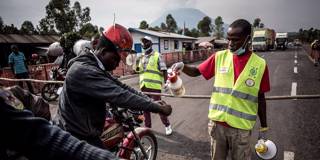Even as large-scale epidemics proliferate, the international community continues to get even the most basic aspects of prevention and preparedness wrong. Nowhere is this more apparent than in the lack of readily available clean water in health-care facilities.
LONDON – A year has passed since the Democratic Republic of the Congo’s health ministry declared a new outbreak of Ebola in the northeast of the country. Yet, far from being contained, the outbreak has now become the DRC’s second in five years to be classified by the World Health Organization as a Public Health Emergency of International Concern, the most severe designation – used just four times previously – that the WHO can make. It is the second-largest Ebola outbreak ever recorded.
A highly effective experimental vaccine against Ebola is available, and teams on the ground are working hard to bring the virus under control. But, with the outbreak occurring within a volatile conflict zone, the odds are stacked against them. In the first seven months of this year, 198 attacks were carried out against health-care workers or Ebola treatment facilities, leaving seven dead and 58 injured.
Yet the failure to contain the current crisis reflects shortcomings that extend far beyond the DRC. Even as large-scale epidemics proliferate, the international community continues to get even the most basic aspects of prevention and preparedness wrong. When it comes to a disease like Ebola – which is highly communicable and has a mortality rate of around 50% – such lapses have devastating consequences.

LONDON – A year has passed since the Democratic Republic of the Congo’s health ministry declared a new outbreak of Ebola in the northeast of the country. Yet, far from being contained, the outbreak has now become the DRC’s second in five years to be classified by the World Health Organization as a Public Health Emergency of International Concern, the most severe designation – used just four times previously – that the WHO can make. It is the second-largest Ebola outbreak ever recorded.
A highly effective experimental vaccine against Ebola is available, and teams on the ground are working hard to bring the virus under control. But, with the outbreak occurring within a volatile conflict zone, the odds are stacked against them. In the first seven months of this year, 198 attacks were carried out against health-care workers or Ebola treatment facilities, leaving seven dead and 58 injured.
Yet the failure to contain the current crisis reflects shortcomings that extend far beyond the DRC. Even as large-scale epidemics proliferate, the international community continues to get even the most basic aspects of prevention and preparedness wrong. When it comes to a disease like Ebola – which is highly communicable and has a mortality rate of around 50% – such lapses have devastating consequences.